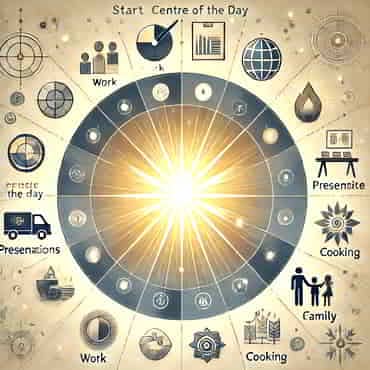Get Things Done: “Prioritise, Energise, and Schedule Tasks” (PEST)

Estimated reading time: 11 Min
Time isn’t the key to get things done! The PEST framework shapes everything we do. Prioritise, Energise, Schedule Tasks along with FoPs!
From our daily commutes to binge-watching shows, how we invest our time informs our entire life’s rhythm.
But let’s get real: time is only part of the equation.
For example, imagine trying to run a marathon without eating breakfast.
It isn’t happening.
That’s where priorities and energy levels step in.
Energy fuels our ability to present our best selves in work, hobbies, and our relationships.
Balancing how we manage time and harness our energy can transform how we tick through our days.
Prioritising creates that balance.
The PEST framework is like a personal trainer for your schedule.
It helps you choose what you want to focus on, making sure your energy levels are up to the task and breaking those dull routines that keep you stuck.
It’s an empowering approach, especially in a world where barely anyone controls their full schedule.
But let’s face it—you can’t control the clock ticking, but you can control where your attention goes.
Picture running your day with purpose—a purpose that translates into real, tangible progress.
Control your focus, and you’ll find yourself achieving those big goals that previously felt out of reach.
This isn’t about squeezing productivity out of every second; it’s about working smarter and more intentionally, ensuring what really matters gets done.
So what are we talking about here?
It’s about setting priorities, protecting them, beating distractions, and finding a sustainable rhythm and energy for work and life.
Break the default cycle and start living more intentionally, more aligned with your core desires.
So let’s get started—your more focused, energised life awaits.
Introducing FoP: You Choose A Focal Priority For Your Day
Ever feel like your day just slips through your fingers?
You’re not alone.
Endless to-do lists and urgent tasks can easily serve to bog you down!
The trick?
Start each day with a clear focal priority—or, as I like to call it, your daily “FoP.”
What’s a FoP, you ask?

Think of it as the centrepiece of your day—the one thing you absolutely want to get done today.
I choose my words carefully; I say want to do, not necessarily must do.
Remember, this is your priority, not necessarily someone else’s.
It could be anything from nailing that presentation at work to cooking a hearty dinner for your loved ones.
Other’s priorities will influence your choice of FoP on some days.
It’s all about picking an activity that you’ll prioritise and protect like your life depends on it.
This simple step can flip the script on your entire day.
Choosing your FoP is all about identifying what will bring you the most satisfaction.
Is there a project at work that you need to finally tackle?
Maybe it’s a day to spend quality time with your family or even indulge in a hobby that recharges you.
Your FoP should align with what you value most and give you a sense of accomplishment.
Don’t worry about massive projects alone.
Smaller wins can be just as rewarding.
Got a stack of unread books?
Make reading a chapter your FoP. Want to get fitter?
Commit to a 30-minute walk.
The key is to pick something you’re excited about and then guard that time fiercely in your calendar.
Once you’ve identified your FoP, break it down into actionable steps.
For example, if your goal is to finish a presentation, list out all the mini tasks—writing the closing remarks, completing the slides, and running through a practice session.
By slicing it up, you make it more digestible and are more likely to follow through.
Picking a FoP every day isn’t about adding more stress but about giving your day a strong anchor.
It’s an investment in yourself—a chance to steer your day instead of letting it steamroll over you.
Trust me, a little planning goes a long way in making you feel in control and productive.
Are you ready to choose your FoP for tomorrow?
Laser Focus: Beating Distractions to Stay on Track
Distractions are everywhere.
From the constant ping of notifications to the siren call of social media, staying focused can feel like an uphill battle.
But here’s the deal—you don’t have to succumb to these interruptions.
The trick?
Laser focus.

To put it bluntly, distraction is the enemy of productivity.
And let’s face it, going off the grid completely isn’t an option.
A smarter approach involves redesigning how you interact with technology and the environment around you.
This way, you can shield your attention from the noise and zero in on your FoP.
Your first move?
Identify what tends to pull your focus away.
Is it your phone lighting up with social updates?
Maybe it’s the never-ending email thread or even background noise at home.
Once you recognise these culprits, you can take steps to manage them directly.
A few game-changing strategies include logging out of social media apps or setting specific times to check emails.
If your phone’s a major distraction, app blockers can be lifesavers.
You can also designate ‘do not disturb’ periods where only important calls can come through.
Trust me, these small tweaks can make a world of difference in maintaining your focus.
Another brilliant tactic is creating a work environment that fuels concentration.
Think about your workspace—declutter it, make it inviting, and minimise potential distractions.
Even a simple move like facing your desk away from distracting views can help.
Once you’ve set the stage, practice single-tasking.
Push multitasking to the side and commit to focusing on one thing at a time.
Research shows that juggling multiple tasks can drastically reduce efficiency and increase stress.
Focus on one task at a time, which allows you to complete it faster and with better quality.
And don’t forget about taking intentional breaks.
Stepping away for a few minutes can actually sharpen your focus.
A short walk, some deep breathing, or a quick stretch can recharge your brain, making it easier to return to your work refreshed.
Implementing these strategies will take you from easily distracted to laser-focused.
By taking proactive steps to minimise interruptions, you can dedicate more time and energy to what truly matters.
Your FoP will thank you.
Energise: Recharging Your Brain Through Physical Well-being
Ever tried to focus when you’re running on fumes?
It may be impossible, but it is certainly challenging.
Your brain needs fuel to function, and that fuel comes from taking care of your body.
This is where the Energise part of the framework steps in, ensuring your physical health powers your mental clarity.
Start with exercise—it doesn’t have to mean hitting the gym for hours.
We’re talking about daily habits that aren’t hard to adopt but can make a world of difference.

A brisk walk, a quick session of yoga, or even a dance party in your living room can spike your energy levels.
Food is another biggie.
Ever heard of ‘brain food’?
It’s a thing.
Nutritious meals packed with lean proteins, whole grains, and a rainbow of fruits and veggies can keep your mind sharp.
And don’t underestimate the power of hydration.
Realise that even mild dehydration can sap your energy and focus.
Now, let’s get real about sleep.
Burning the midnight oil might seem heroic, but it’s a fast track to burnout.
Aim for 7-9 solid hours of sleep a night.
Create a bedtime routine that helps you wind down.
Reading a book, dimming the lights, or even some light stretching can signal your body that it’s time to relax.
Quiet time is your secret weapon.
Our world is noisy, and your brain needs a break from the constant input.
Whether it’s meditation, mindful deep breathing exercises, or just sitting quietly with your thoughts, find moments in the day to embrace silence.
Let’s not forget about face-to-face time.
Good, old-fashioned human interaction can give you a sense of belonging and boost your mood.
It’s easy to communicate digitally, but nothing beats a real conversation over coffee or a casual chat during a walk.
So that’s four areas that might need improving.
Making these changes doesn’t mean overhauling your life.
Simple shifts can give you immediate rewards.
Sneak a nap when you can, give yourself partial credit for even small bits of exercise, and learn to use caffeine strategically.
It’s about small, actionable steps that keep your energy reservoir full.
Reflection: Evaluating and Learning From Each Day
Every day is a mini-experiment in how we use our time and energy.
By taking a few moments to reflect, you gain valuable insights into what’s working and what isn’t.
Start by keeping it simple.
Here are some ideas for jotting down a few notes at the end of each day:
- What was your FoP?
- Did you complete it?
- What distracted you?
- What worked?
- What didn’t work?
- How did you feel energy-wise?
- Is there anything you’ll change in the future?
These reflections don’t need to be extensive—bullet points or short sentences work just fine.
Reflection is your tool for continuous improvement.
By regularly reviewing your day, you identify patterns and can tweak your strategies.
Maybe you notice certain times of day when you’re more productive or pinpoint recurring distractions that need addressing.
This is also your moment to celebrate wins, no matter how small.
Consistently nailing your FoP or successfully overcoming a distraction deserves recognition.
Over time, these small victories build a sense of accomplishment and keep you motivated.
Remember to be kind to yourself during this reflection.
None of us are perfect, and there will be days where things don’t go as planned.
That’s okay.
Each day is a new opportunity to adjust and try again.
Reflection helps you stay connected to your long-term goals.
It’s easy to lose sight of the big picture when you’re bogged down with daily tasks.
By stepping back and reviewing your day, you reconnect with what truly matters, making it easier to stay focused and energised moving forward.
Flexibility: Adapting the Time and Energy Framework to Your Life
Life’s unpredictable, and sticking rigidly to a plan isn’t always practical.
Flexibility within the PEST framework is your key to sanity.
Adaptability lets you roll with the punches and still stay on track.
Not every tactic in the framework will work for everyone or in every situation.
That’s OK.
Flexibility means customising strategies to fit your unique needs and circumstances.
Your energy levels, distractions, and priorities might differ day-to-day, and adjusting your approach is not just acceptable—it’s essential.
Real-life can throw curveballs—a sudden work project, personal commitments, or simply an off day.
When this happens, having a flexible mindset helps you adapt without stressing out.
If your original FoP gets sidelined, pick a backup that still gives you a sense of achievement.
The goal is to maintain forward momentum, even in the face of disruptions.
It’s also vital to understand that your approach can (and should) evolve.
What works during a busy work week might need a tweak on weekends.
Maybe you find certain tactics more useful during different seasons of life, like juggling a new job or welcoming a new family member.
Constantly assess and re-evaluate what’s effective and what isn’t, and be ready to switch gears.
Flexibility doesn’t mean lack of discipline.
It means being realistic about life’s ups and downs and adjusting accordingly.
Embrace the ebb and flow rather than fighting against it.
Some days you’ll ace your FoP and have energy to spare; other days you’ll just scrape by.
Both are fine.
Lastly, don’t measure your success against anyone else’s. You’ll hear about people who seem to be nailing every aspect of their lives effortlessly; remember, these FoPs rarely show the full picture.
Focus on your own journey, and adjust your strategies to serve your personal growth and goals.
Building Long-term Habits: From Daily Practice to Lifestyle Change
You’ve probably noticed how small, daily practices can create big changes over time—it’s the magic of habits.
The goal is to transition from short-term tactics to long-term habits that become second nature.
Consistency is important here.
Building solid habits around choosing your FoP, maintaining laser focus, and fuelling your energy reserves turns these actions into your default mode.
The more consistent you are, the less cognitive load it takes to stick to them.
Tracking your progress is a fantastic way to stay motivated.
Whether it’s a journal, an app, or simple checkmarks on a calendar, seeing those small wins accumulate provides a sense of accomplishment.
Over time, these wins build into significant progress, making you less likely to deviate from your goals.
Start with one or two key habits at a time.
Trying to overhaul everything all at once can be overwhelming.
Focus on solidifying one habit—like setting your daily FoP—before layering in another, like minimising distractions.
This approach makes each habit more manageable and sustainable.
Another tip is to build habits around existing routines.
If you already have a morning ritual, integrate picking your FoP into that time.
Immediately record it in your journal, ready to add comments later.
This way, you’re not creating new routines from scratch but enhancing what you already do.
Overcoming obstacles is part of the journey.
There will be setbacks and days when you fall off track.
The key is to acknowledge these moments without self-judgment and use them as learning opportunities.
Each day is a fresh start, so get back up and continue building those habits.
Lastly, celebrate your milestones.
Whether it’s a week of consistent FoP setting or a full month of beating distractions, acknowledging your efforts keeps the momentum going.
Reward yourself in small ways to reinforce positive behaviour and keep your motivation high.
Summary: Prioritise, Energise, Schedule Time – Embracing Intentional Living
In a world brimming with distractions and perpetual busyness, embracing intentional living could be a game-changer.
The PEST framework isn’t about squeezing productivity out of every second, but about finding a balance that lets you focus on what truly matters.
With every day as a fresh opportunity, you set your FoP, eliminate distractions with laser focus, and fuel your brain and body for the journey.
By reflecting on your progress and remaining flexible, you develop habits that transform the fleeting nature of time into purposeful actions.
It’s all about making progress, not being perfect.
Some days you’ll hit it out of the park, and other days might be a struggle.
That’s OK.
The goal is to keep steering your life in a direction that aligns with your values and aspirations.
Keep tweaking, adjusting, and learning from your experiences.
Adopting this approach doesn’t require drastic changes.
Small, consistent tweaks add up, making a significant difference over time.
Whether it’s a big career move, spending quality time with family, or simply finding moments of quiet, intentional living helps you make the most out of your life.
So here’s to living a more deliberate, focused, and energised life.
Embrace the journey, celebrate your milestones, and continue adapting with flexibility.
Your best days are yet to come.
Please let me know what you think in the comments or via the contact form. I look forward to hearing from you!
😉
Richard






